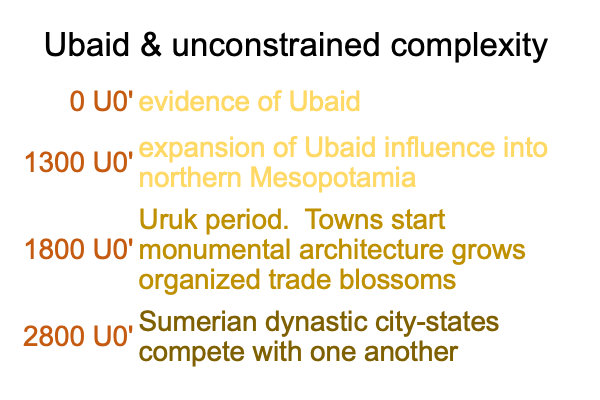0177 In chapter 5, Daniel Houck reviews how several modern theologians approach the topic of original sin.
He wonders (more or less), “How can the concept of a historical Fall be compatible with evolutionary theory of the twentieth century?”
The first singularity answers this question. Human evolution comes with a twist. The first singularity potentiates history.
As soon as the Ubaid appears in the archaeological record, this culture manifests the potential of unconstrained complexity. Hand-talk facilitates implicit abstraction. Implicit abstraction constrains social complexity. Speech-alone talk allows explicit abstraction. Explicit abstraction opens the door to unconstrained social complexity.
0179 Here is a picture of the timeline for southern Mesopotamia.

0180 What about the other hand-speech talking cultures?
What do the cultures adjacent to the Ubaid witness?
They see a culture increasing in wealth and power. They also see a people who do not talk with their hands.
In terms of natural signification, the lack of hand talk cannot be ignored. Does their lack of hand talk account for their obvious success?
Imitation is the highest form of flattery.
0181 Dismissing one’s hand talk does not come lightly. Timeless traditions are passed on with hand talk.
Ah, but hand talk words already have equivalent speech words. So, maybe the loss of hand talk does not appear significant.
Perhaps, one can translate certain manual-brachial word-gestures into speech-alone talk.
0182 But, a silence is missing. Commitment2c is silent. It2c signifies through the person’s actions.
Surely, hand-speech talking shamans sense the implications. They fight against adopting the ways of the neighboring Ubaid. Little do they realize, they are only postponing the inevitable. No one can stop the march of increasing labor and social specialization. The Ubaid sends missionaries, traders and warriors. They say, “Look at our wealth and power.”
0183 Exposure to speech-alone talk spreads along paths of down-the-line trading, westwards, toward Egypt and the Aegean, eastwards into the valleys of the Zagros Mountains and on to the hills surrounding the Indus River Valley, and northwards, to the foothills of the Caucasus Mountains.
In far northern Mesopotamia, a tribe adopts the new way of talking. That tribe migrates over the Caucasus mountains and onto the steppes of Russia. Then, it transforms into diverse roving chiefdom-based cultures, all speaking the same language. Then, these cultures migrate, west into Europe and southwards into Iran and India, spreading Indo-European languages through elite dominance.
0184 Speech-alone talk spreads to the corners of the world.
In the process, what happens to original justice2c?
I read the stories that begin at Genesis 2:4.
Do these tell me ‘something’ about the emergence of unconstrained social complexity during the Ubaid (and Uruk) archaeological periods of southern Mesopotamia?
0185 The substitution of speech-alone talk for hand-speech talk is so simple to achieve. Then, what the culture then achieves seems amazing (at least compared to constrained social complexity). And yet, ‘something’ is lost. Houck’s packaging of Aquinas’s position holds. Evil is a privation of a good. Original sin is the privation of original justice.
0186 Original justice does not simply disappear.
It is rejected, just like the shamans who stood in the path of um… “progress”.
